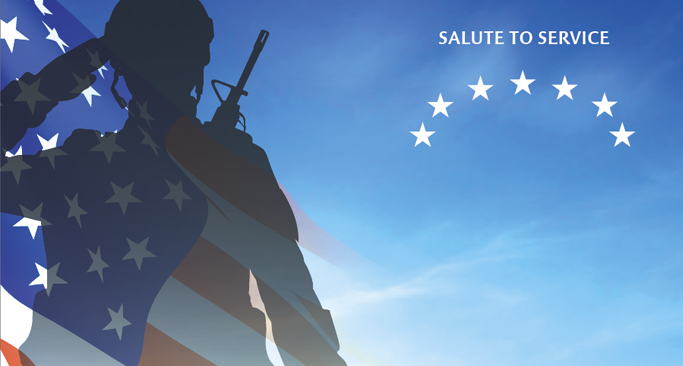With Veterans Day observing its
70th anniversary, two insurance
professionals share their military experiences
By Christopher W. Cook
Seventy years ago, in 1954, President Dwight Eisenhower signed a bill presented by U.S. Representative Ed Rees (Kansas) making Veterans Day, formerly known as Armistice Day, a federal holiday. Observed on November 11, the holiday is a day to honor and thank those who have served in the United States military.
Six years ago, I wrote an article “Thank you for your service(s)” that appeared in the November 2018 issue of Rough Notes. While not officially known then as the Salute to Service feature—think of it as our Armistice Day—the article is a nod of gratitude to veterans now working in the insurance industry.
To the two featured in this month’s installment—and all veterans—thank you for your service.
Army Sergeant Stacey
Lee Stacey, managing director at McGowan Allied Specialty Insurance, enlisted in the United States Army in 1985 after graduating from high school. After finishing basic training and infantry school, he was assigned to a tour of duty in Panmunjom, South Korea.
“As an 18-year-old E1 private, I got off the plane in Seoul and was segregated into a small group because I was over 200 pounds and over six feet tall,” Stacey says. “I was assigned to the United Nations Command Security Battalion, Joint Security Area (UNCSB-JSA), which provided physical security in the truce village of Panmunjom in the center of the demilitarized zone (DMZ). Because of our visibility to the North Korean troops in the JSA, they wanted bigger guys.
“We conducted nighttime combat patrols in the DMZ with full ammo, grenades, and claymores. Our goal was to attempt to engage with North Korean KPA (Korean People’s Army) regulars who illegally were patrolling over onto our side of the line at nighttime. We were in a very isolated installation called Camp Bonifas, which is in the Guiness Book of World Records as having the most dangerous hole of golf in the world—the fairway is laced with landmines.”
Stacey’s roommate at Camp Bonifas had served time in the Ranger Regiment. “[After talking to him], I figured out on pretty short order that that was what I wanted to do next,” Stacey says.
After returning to the States in 1986, Stacey attended Airborne School and Ranger Indoctrination at Fort Benning, Georgia. “While airborne school was very easy, with the Ranger Indoctrination Program (RIP), my class started with 54 and only graduated 13,” he says. Stacey was then assigned to the 1st Airborne Ranger Battalion (1st Special Operations Command, now USASOC).
“Ranger School was from July to October in 1987, and it was every bit the gut check that you hear it is. I went from 210 pounds to 168 pounds in three months. I somehow managed to graduate going through each phase the first time through with no recycles.”
In early 1988, Stacey deployed with the 1st Ranger Battalion to Fort Sherman in Panama for the Jungle Operations Training Course (JOTC).
“It was lots of fun in the jungle, but so hot and wet; our fatigues would start to disintegrate on our bodies, and you had to be careful with the very large poisonous insects,” Stacey says. “President Ronald Reagan was flexing his muscles with [Panama’s] Manuel Noriega at that time and was rotating many special operations forces through JOTC as a show of force and a precursor to the invasion of OPERATION JUST CAUSE in December 1989.”
He separated from service about 90 days before that operation went down, but many of Stacey’s buddies parachuted into Panama on that op.
“On my 43rd jump [with the 1st Ranger Battalion], I suffered a bad knee injury, and was medically separated from service as a Sergeant,” he explains. “The accident left me with a rebuilt right knee, a slight limp, and a 30% disability rating with the VA (Veterans Affairs). It was now time to head off to college on the G.I. Bill as a 22-year-old freshman.”
Stacey graduated from Grand Valley State University in Michigan with a Bachelor of Business Administration degree in three years.
“I was originally tracking in college to be a federal special agent and was interviewing with the Bureau of Alcohol, Tobacco and Firearms (ATF) upon graduation,” Stacey says. “The Clinton administration put a 12-month federal hiring freeze in place the month I was supposed to hire on, and I was dating a woman (now my wife of 30 years) who was looking for an engagement ring. I needed a job and, like most of us in the industry, I ‘fell into’ it.”
Stacey saw an ad in a newspaper for a job opening: “property and casualty underwriting trainee position; veterans given preferred hiring status.”
“I applied, and the guy who hired me was a Vietnam vet. To this day, even though he’s long retired, he’s like a big brother and mentor to me,” Stacey says.
“I spent the next three decades moving up in the industry, working for private and publicly traded brokers as a middle manager and eventually executive manager. My last two career stops have been as an agency owner and now the senior executive manager of a large MGA.”
Marine Corporal Seong
After immigrating to the United States in 1984 at the age of five, Daniel Seong, founder of Great Park Insurance (the May 2021 Rough Notes Agency of the Month) in California, enlisted in the Marines after high school.
“My dad went through the military in Korea, but my brother and I were the only ones who joined from our generation,” Seong says. “I remember going to the recruiter’s office with my brother; we didn’t even tell my parents. I graduated from high school on June 10, and I was on the bus for boot camp on June 15.
“It was my first time being away from home, but I wasn’t very far. I grew up in Burbank and boot camp was in San Diego. I was there for 13 weeks, and those were probably some of the scariest of my life. The first three or four days, you didn’t sleep. I remember seeing grown men peeing their pants because they were too scared to ask the drill instructor if they could use the bathroom.”
“Many [special operators] think they need to strap a gun on their leg
to perform a noble mission of safeguarding the country … even in civilian life,
and [the Special Operators Transition Foundation] assist[s]
them in exploring industries [like insurance] that are more ‘commercially focused.’”
—Lee Stacey
Managing Director
McGowan Allied Specialty Insurance
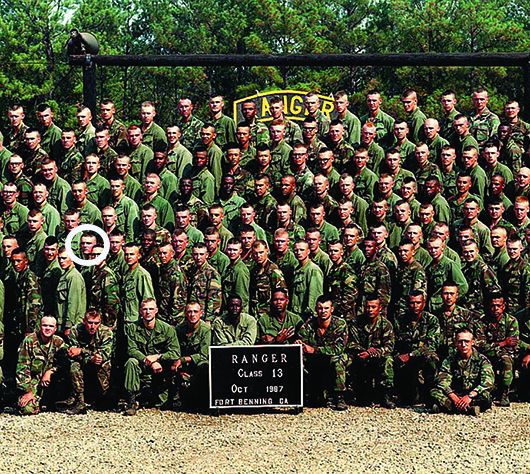
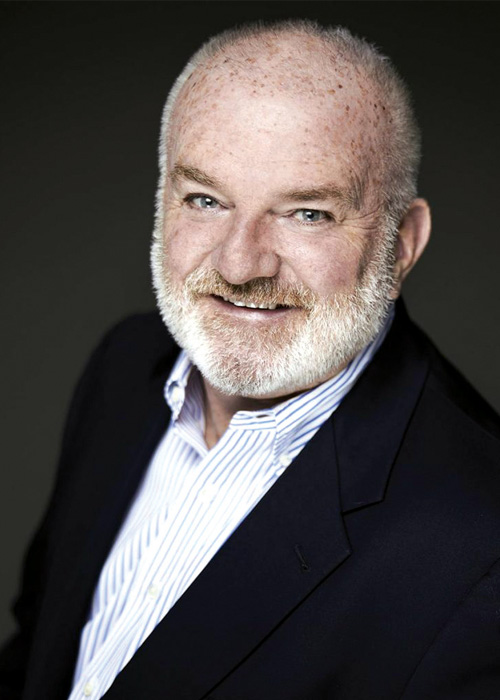
Seong’s brother started boot camp a few weeks later and, while they didn’t see each other often, one encounter remains a memorable story.
“In boot camp, not only are you training, but you’re also on special detail teams working on base,” Seong says, “and every movement, every word, every minute, is controlled. That week I was serving food in the Chow Hall line. When it’s time to go to chow, you get in line, you grab your tray, you have your arms at a 90-degree angle and move step by step down the line.
“We were about two feet away, and I saw my brother come in and he looked a little skinny,” he continues. “I gave him two donuts instead of one. When he was sitting down, the drill instructor saw that he had two donuts. For this, they made him run an extra three miles, do 100 pushups and 100 sit-ups to burn off the extra donut. I forget all the other things that they made him do, but they gave him a hard time because of his loving brother.
“As strict and serious as they look, drill instructors are human; they’re just like us, and there’s humor behind some of the things they do. Intensity is still very much a level 10.”
Following boot camp, Seong was stationed in Okinawa, Japan. “When I came to the United States in 1984, that was my first time ever on an airplane. My second time ever was in 1998 going to my first duty station.
“When you were on base, you were basically in America; nothing was different. But the minute you went outside the gates, you realized you were in a different country. I was there for a year.”
“Whenever I see a résumé that
includes military service, I know
automatically that they know what discipline,
hard work and commitment means to an organization.”
—Daniel Seong
Founder
Great Park Insurance
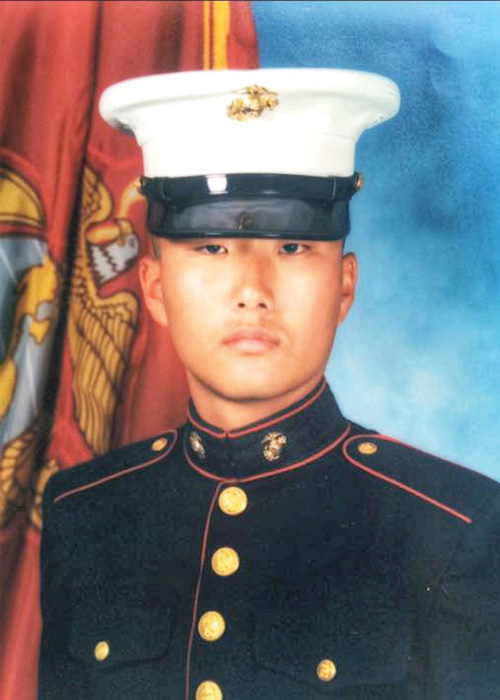
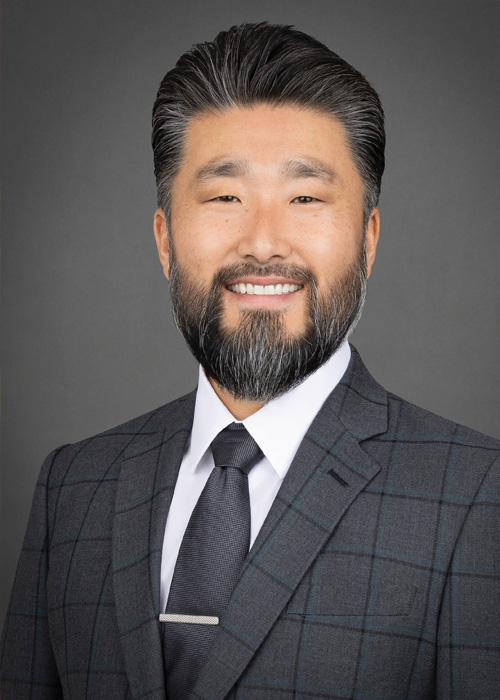
Seong’s second duty station was in Miramar, San Diego, where he served for about two and a half years.
During his active duty, “I wasn’t out in the field. I worked in an office doing back-end administrative work, similar to what I’m doing now in the insurance industry,” Seong says. “I’d start the day with physical training and would then work from 7:30 to about 4:30. I had a flexible schedule. After 4:30 I had liberty, so I went to school part time and got a part-time job at Red Lobster as a bartender.”
Seong was discharged with the rank of corporal in 2002.
As for his insurance career, it started out of desperation. “I had a failed business, we were filing for bankruptcy and were down to our last couple of dollars,” Seong says. “I didn’t know anybody working in insurance, but I researched a few different industries, and it made sense.”
Great Park Insurance opened its doors in 2007.
“We started from scratch. Looking back at it, I tell everybody that we started below scratch; we were in the hole [from the beginning],” Seong says. “The first five years, I took seven days off and five of those days were for Christmases. I had two jobs during the day and worked a graveyard shift at night. I was laser-focused on getting [the agency] off the ground.
“For the first 12 months, you’re writing 12-month policies; you don’t see rewards until the 13th month. My commission statement in that 13th month, not only did it say new business commission, but it said renewal commission. From that point on, I had a real a-ha moment that this is real.”
A career for veterans
Through their military experiences, Stacey and Seong developed traits well received in and fitting for the insurance industry.
“In the Army we learned discipline, servant leadership, willingness to take risks, fanatical professional dedication, looking out for people, and integrity,” Stacey says. “It was about having a never-quit attitude.”
Remembering the statement ‘veterans given preferred hiring status’ on his initial job application, today Stacey helps veterans transition to the workforce as an adviser for the Special Operators Transition Foundation (SOTF).
“We provide transitional assistance to mid-career special operators (Rangers, Green Berets, SEALs, U.S. Air Force Combat Controllers [CCTs] and Pararescuemen [PJs], U.S. Marine Corps Raiders/Recon/Force Recon) who need help transitioning back into the real world for career advice and guidance,” Stacey says.
“One of the most difficult hurdles they all universally face is being able to translate their inherent well-honed skillset into relatable, concrete leadership qualities that can benefit commercial companies,” he adds.
“Many of these guys think they need to strap a gun on their leg to perform a noble mission of safeguarding the country (just like I thought in 1992), even in civilian life, and we assist them in exploring industries that are more ‘commercially focused.’ Insurance is a wonderful career, but few outside the industry can relate if they have never seen, heard, or felt it. Having been in both worlds, I can speak their language and offer assistance whenever I can,” Stacey concludes.
“When I was in the military, that was the first time I truly saw and knew what hard work physically looked like,” Seong says. “[The Marines] taught me discipline and commitment. If it wasn’t for the mental toughness I learned in the Marines, I don’t know if I could have made it through my struggles.
“I absolutely recommend the industry to veterans because if they can make it through boot camp and the field, they can handle any obstacle in the industry,” he continues. “Whenever I see a résumé that includes military service, I know automatically that they know what discipline, hard work and commitment means to an organization.
“In the Marines, the first goal is mission accomplishment; we’re growing an agency at all costs. Troop welfare is second, taking care of your people and giving back to the community. That’s what veterans are about,” Seong concludes.
For more information:
Special Operators Transition Foundation
sotf.org

